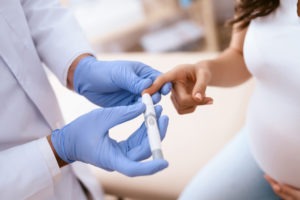
Doctors may fail to diagnose gestational diabetes in pregnant patients due to the lack of warning signs and symptoms caused by the condition. Unlike complications such as late-stage cholestasis of pregnancy, gestational diabetes is difficult to outwardly identify.
It rarely becomes apparent that something is wrong—until it is too late and the condition results in complications after lack of treatment. It is possible that doctors can identify the condition by an onslaught of increased thirst and frequent bouts of urination, but these warning signs will not appear in many cases.
Yet, even though there are very few proven warning signs of gestational diabetes, doctors and medical staff tasked with caring for pregnant patients should know when the mother is at risk of contracting the condition. As such, when people ask, “what causes a doctor to fail to diagnose gestational diabetes?” there is another major factor to consider for a missed diagnosis: medical malpractice.
Timeline to Diagnose Gestational Diabetes
Gestational diabetes does not normally develop until approximately the 24th week of pregnancy. If the attending physicians perform their jobs correctly, most at-risk mothers will receive testing between their 24th and 28th week of pregnancy.
However, many mothers may display at-risk traits that warrant earlier testing. This can determine if the patient is suffering from the precursor to gestational diabetes: insulin resistance.
According to a study by the Journal of Diabetes Research, insulin resistance is common during pregnancy. Most women experience between 50% and 60% of a decrease in their sensitivity to insulin. In response, the body should begin to increase insulin production—yet this is not always the case. The risk factors that can complicate insulin resistance may include if the mother has:
- Previously given birth to a child weighing more than nine pounds
- Previous diagnoses of gestational diabetes or prediabetes.
- A family history of diabetes.
- A diagnosis of obesity.
- Polycystic Ovary Syndrome.
- A lack of daily physical activity.
- And more.
"If your child was born with a birth injury, or cerebral palsy, we can help."
If Gestational Diabetes Goes Untreated
Mothers with untreated gestational diabetes may also have high blood pressure. More seriously, they can develop preeclampsia, which can threaten the life of both mother and child. Due to the effects gestational diabetes can have on a newborn’s weight, it can also make it more likely that the mother will need to undergo a cesarean section (C-section) procedure.
Further, if a mother has gestational diabetes, the fetus has a higher likelihood of suffering complications like:
- Low blood sugar levels.
- Type 2 diabetes later in life, which occurs in roughly 50% of women originally suffering from gestational diabetes, according to the Centers for Disease Control and Prevention (CDC).
- Weighing more than 9 pounds, potentially making a vaginal birth more difficult or dangerous.
- A premature delivery, possibly resulting in dangerous respiratory issues.
- Being delivered stillborn or passing away in the womb.
Liability for Gestational Diabetes
There is no excuse for medical professionals failing to diagnose this condition. When risk factors are present, simple tests can identify gestational diabetes, thereby allowing treatment to begin at an earlier date.
In cases where patients do not receive a diagnosis and they suffer health complications as a result, they may be entitled to bring legal action against the negligent medical parties. If the mother received treatment, the condition likely would not have caused any serious adverse health effects.
"We know first-hand what you are going through."
Lawyers Representing Birth Injury Cases Caused by Medical Malpractice
Here at the Birth Injury Lawyers Group, we work for victims of gestational diabetes who would have otherwise had a healthy pregnancy if they received a diagnosis early enough. When medical professionals betray their patients’ trust like this, they deserve to be held accountable for the pain and suffering they have caused.
If you choose to retain one of our birth injury attorneys, we will work to gather evidence in your case, hopefully proving that the negligent parties were liable. This could make you eligible to receive compensation for the losses and pain you had to endure.
If you are still asking, “What causes a doctor to fail to diagnose gestational diabetes?” or if you have any other questions related to your potential legal case, contact a representative at the Birth Injury Lawyers Group today. Call (800) 222-9529 for your free case review and consultation.
"We are committed to helping families who have suffered medical negligence."
